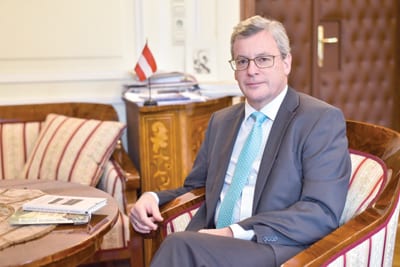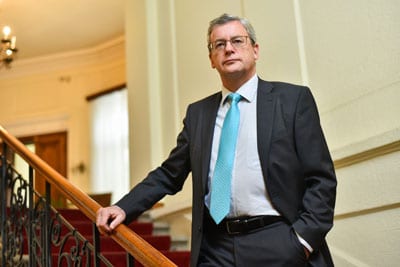There is admittedly no clear answer regarding precisely when and how the goal of full EU membership will be achieved – but it is certain that convincing reform programmes in the individual candidate countries will greatly help to bring more clarity
The Austrian Ambassador to Serbia, H.E. Johannes Eigner, is certain that the EU enlargement process will continue, because, as he says, the route laid down in Thessaloniki (in the year 2000) cannot culminate in a dead-end street. He describes the cooperation with Serbia as being “five-star”, but says that there’s always room for improvement. He sees new directions for the advancement of relations in regional cooperation, such as that which already exists between Vojvodina and Austrian regions, but also in direct contact with individual cities and municipalities.
Apart from contributing to strengthening political and economic ties between the two countries, Ambassador Eigner, who is also a translator, has also embarked on a literary adventure: he has translated into German Filip David’s NIN Award-winning novel “The House of Memory and Oblivion”, which he says is the first German translation of the work of this important author.
Your Excellency, the latest round of talks among the countries along the so-called migrant route was recently held in Vienna. The meeting showed that a common EU approach to the problem is still non-existent. Does this concern you?
I think it is not exaggerated to say that the EU was literally overwhelmed by the magnitude of the refugee and migrant crisis that hit the Union last year and is far from being over.

Or, to be more precise, which hit some of its members particularly hard, among them Austria, who last year alone accepted close to 90,000 asylum-seekers, the second-highest figure per capita among all EU member states. It turned out that the existing EU instruments, like the Dublin regulation, were only suited for sporadic cases of asylum seekers, not for that kind of mass influx. And, of course, it is difficult if not impossible to repair a ship in the midst of a storm, besides the fact that there quite contrasting views about where to start with the repair works. In that situation of utmost urgency, regional approaches, of which Serbia is part, had to be envisaged.
Following the referendum in Hungary, Austrian Chancellor Christian Kern warned the countries of Eastern Europe that “solidarity is not one-way”, insisting that these countries also receive great assistance from other EU members. In your opinion, to what extent does the migrant crisis endanger the very idea of unity in the EU?
It is true that the very spirit of solidarity, and hence unity itself – for there is no unity without a reasonable degree of solidarity – is being put to a serious test. However, even with the highest degree of unity and unanimity, solutions would not be easy to find and implement: the best-agreed relocation scheme for an equal distribution of refugees will not work if people refuse to go to certain countries – there are EU member states which offered to host a certain number of refugees, but which are still waiting for the first arrivals…
Even with the highest degree of unity and unanimity, solutions would not be easy to find and implement: the best agreed relocation scheme for an equal distribution of refugees will not work if people refuse to go to certain countries – there are EU member states which offered to host a certain number of refugees, but which are still waiting for the first arrivals…
The Serbian delegation warned of an increasing influx of refugees and the financial problem it is facing. Do you believe this appeal will be understood?
Serbia indeed carries a considerable burden and it needs corresponding assistance. And this is also understood by international donors. The EU, for instance, has so far provided around €40 million, through various channels, including budgetary support. And the problems, the respective search for solutions, cannot be reduced to merely financial aspect alone. One must have a reasonably clear understanding as to who should do what apart from providing food and shelter.
How far are we from the implementation of the proposal that Austria assists Serbia in controlling the border with Macedonia by deploying its policemen and soldiers in that area? This was proposed by Austrian Chancellor Kern at his last meeting with Serbian Prime Minister Vučić.
Austria also clearly recognises the role Serbia plays in tackling the crisis and the need to provide assistance therein. Therefore, already at a very early stage, it sent a number of police officers to the border with Macedonia and is ready to do so again in order to help, this time to strengthen the control of the Serbian- Bulgarian border.
There are a number of reasons for this specific interest Austria has for the Autonomous Province of Vojvodina: historical links, geographic proximity – by air, Graz is closer to Subotica than Niš – and precisely the fact that, as an Autonomous Province, it is a natural partner for Austria’s federal regions, the “Bundesländer”. Styria, for instance, is one of those that has longstanding contacts and cooperation with Vojvodina
During your career, you’ve also headed the EU office responsible for enlargement. With this in mind, how would you assess the recent statement of Professor Florian Bieber, of the University of Graz, that the Western Balkans is no longer in the EU’s focus due to serious internal problems – namely Brexit and the migrant crisis? How realistic are the prospects of further enlargement after 2020?
Not being in focus does not necessarily mean being forgotten or neglected. And this year’s Western Balkan summit in Paris, held immediately after the referendum in the United Kingdom, was proof that, despite pressing issues like the aforementioned one, the Western Balkan Enlargement Process remains high on the agenda.

And it will certainly remain high on the agenda of Austria’s foreign policy; the road embarked upon in Thessaloniki must not end in the middle of nowhere. There is admittedly no clear answer as to precisely when and how the goal of full membership will be achieved – but it is certain that convincing reform programmes in the individual candidate countries will greatly help to bring more clarity.
You also spoke recently about the need to strengthen the link between the Autonomous Province of Vojvodina and Austrian regions, in an effort to advance bilateral cooperation, in which Vojvodina is the focus. What is most interesting to Austrian partners in that province?
There are a number of reasons for this specific interest Austria has for the Autonomous Province of Vojvodina: historical links, geographic proximity – by air, Graz is closer to Subotica than Niš – and precisely the fact that, as an Autonomous Province, it is a natural partner for Austria’s federal regions, the “Bundesländer”. Styria, for instance, is one of those that has longstanding contacts and cooperation with Vojvodina.
I am glad to confirm that our embassy’s activities both contribute to and also reflect the high level of our bilateral relations and cooperation. So, when we speak about further improvement it is like raising a hotel from “five stars” to “five stars+”! But there is, of course, always room to do more and to do it better
The Austrian Embassy has been one of the most active in Serbia for many years, which has certainly improved bilateral cooperation between the two countries. Where do you see room for the further improvement of cooperation between Austria and Serbia?
I am glad to confirm that our embassy’s activities both contribute to and also reflect the high level of our bilateral relations and cooperation. So, when we speak about the further improvement it is like raising a hotel from “five stars” to “five stars+”! But there is, of course, always room to do more and to do it better. I would, for instance, wish to see more direct contacts between towns and municipalities, or between schools and youth in general.
I felt that it is not sufficiently known what the Holocaust also meant for Serbian Jews, and so I ventured into the translation of this [Filip David’s novel] disturbing and fascinating book, in order to make it accessible to German-speaking readers. It was my first translation from Serbian and, indeed, the first Filip David work ever translated into German
You have been in Serbia for almost four years and citizens are likely less aware that you speak many languages fluently and that you recently translated Filip David’s NIN Award-winning novel “The House of Memory and Oblivion” into German. Why did you choose that particular novel and how do you see contemporary literature in Serbia?
Through the years that I have been fortunate enough to spend in Serbia, I succeeded in mastering the Serbian language to the extent to which I can also enjoy in its literature and theatre.

And, with hindsight, I would have deeply regretted it if I could not! There is a broad variety of styles and subjects in contemporary Serbian literature and what is also interesting is the number of well-known writers who have links to Austria in one way or another, to name just Dragan Velikić or Barbara Marković.
So, it was by following cultural life here that I became aware of Filip David’s novel when he got the NIN Award. It is a very complex book with different layers, a deeply moving and indeed shocking testimony of what happened here to Jewish families, and particularly children, during the Nazi occupation.
Judging from myself, I felt that it is not sufficiently known what the Holocaust also meant for Serbian Jews, and so I ventured into the translation of this disturbing and fascinating book, in order to make it accessible to German-speaking readers.
It was my first translation from Serbian and, indeed, the first Filip David work ever translated into German. With this, I hope that a great Serbian writer will find his admirers among German-speaking friends of literature!